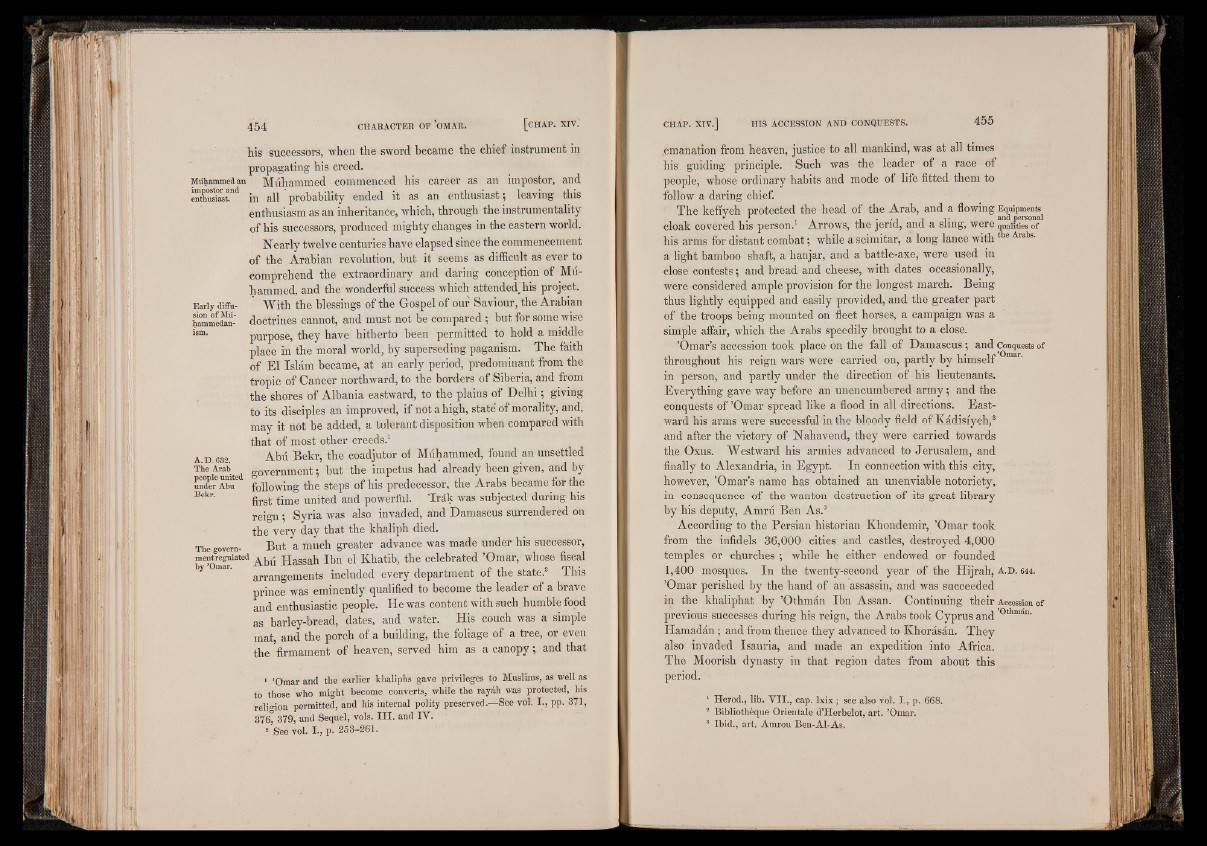
his successors, when the sword became the chief instrument in
propagating his creed.
Muhammedan Muhammed commenced his career as an impostor, and
enthusiast.11 in all probability ended it as an enthusiast; leaving this
enthusiasm as an inheritance, which, through the instrumentality
of his successors, produced mighty changes in the eastern world.
Nearly twelve centuries have elapsed since the commencement
of the Arabian revolution, but it seems as difficult as ever to
comprehend the extraordinary and daring conception of Muhammed,
and the wonderful success which attended,his project.
Early diffu- With the blessings of the Gospel of our Saviour, the Arabian
hXmedan- doctrines cannot, and must not be compared; but for some wise
ism- purpose, they have hitherto been permitted to hold a middle
place in the moral world, by superseding paganism. The faith
of El Islam became, at an early period, predominant from the
tropic of Cancer northward, to the borders of Siberia, and from
the shores of Albania eastward, to the plains of Delhi; giving
to its disciples an improved, if not a high, state of morality, and,
may it not be added, a tolerant disposition when compared with
that of most other creeds.1
A d 632 Abu Bekr, the coadjutor of Muhammed, found an unsettled
fcT&EjjPl government; but the impetus had already been given, and by
under Abu following the steps of his predecessor, the Arabs became for the
Bekr' first time united and powerful. ’Irak was subjected during his
reign; Syria was also invaded, and Damascus surrendered on
the very day that the khaliph died.
The govern- But a much greater advance was made under his successor,
menueguiated Hassah Ibn el Khatib, the celebrated ’Omar, whose fiscal
7 mar arrangements included every department of the state.2 This
prince was eminently qualified to become the leader of a brave
and enthusiastic people. He was content with such humble food
as barley-bread, dates, and water. His couch was a simple
mat, and the porch of a building, the foliage of a tree, or even
the firmament of heaven, served him as a canopy; and that
1 ’Omar and the earlier khaliphs gave privileges to Muslims, as well as
to those who might become converts, while the rayah was protected, his
r e l i g i o n permitted, and his internal polity preserved.—See vol. I ., pp. 371,
376, 379, and Sequel, vols. I I I . and IV.
8 See Vol. I., p. 263-261.
.emanation from heaven, justice to all mankind, was at all times
his guiding principle. Such was the leader of a race of
people, whose Ordinary habits and mode of life fitted them to
follow a daring chief.
The kefiyeh protected the head of the Arab, and a flowing Equipments
, . . . ,i . . ; / 1 -, v and personal cloak covered his person. Arrows, the jerid, and a sling, were qualities of
his arms for distant combat ; while a scimitar, a long lance w iththe Arabs‘
a light bamboo shaft, a hanjar, and a battle-axe, were used in
close contests ; and bread and cheese, with dates occasionally,
were considered ample provision for the longest march. Being
thus lightly equipped and easily provided, and the greater part
of the troops being mounted on fleet horses, a campaign was a
simple affair, which the Arabs speedily brought to a close.
’Omar’s accession took place on the fall of Damascus ; and Conquests of
throughout his reign wars were carried on, partly by himself
in person, and partly under the direction of his lieutenants.
Everything gave way before an unencumbered army ; and the
conquests of ’Omar spread like a flood in all directions. Eastward
his arms were successful in the bloody field of Kádisíyeh,2
and after the victory of Nahavend, they were carried towards
the Oxus. Westward his armies advanced to Jerusalem, and
finally to Alexandria, in Egypt. In connection with this city,
however, ’Omar’s name has obtained an unenviable notoriety,
in consequence of the wanton destruction of its great library
by his deputy, Amrii Ben As.3
According to the Persian historian Khondemir, ’Omar took
from the infidels 36,000 cities and castles, destroyed 4,000
temples or churches ; while he either endowed or founded
1,400 mosques. In the twenty-second year of the Hijrah, a . d . 644.
’Omar perished by the hand of an assassin, and was succeeded
in the khaliphat by ’Othmán Ibn Assail. Continuing their Accession of
previous successes during his reign, the Arabs took Cyprus and 0thman'
Hamadán ; and from thence they advanced to Khorásán. They
also invaded Isauria, and made an expedition into Africa.
The Moorish dynasty in that region dates from about this
period.
1 Herod., lib. V II., cap. lxix ; see also vol. I., p. 668.
2 Bibliothèque Orientale d’Herbelot, art. ’Omar.
3 Ibid., art. Amrou Ben-Al-As.